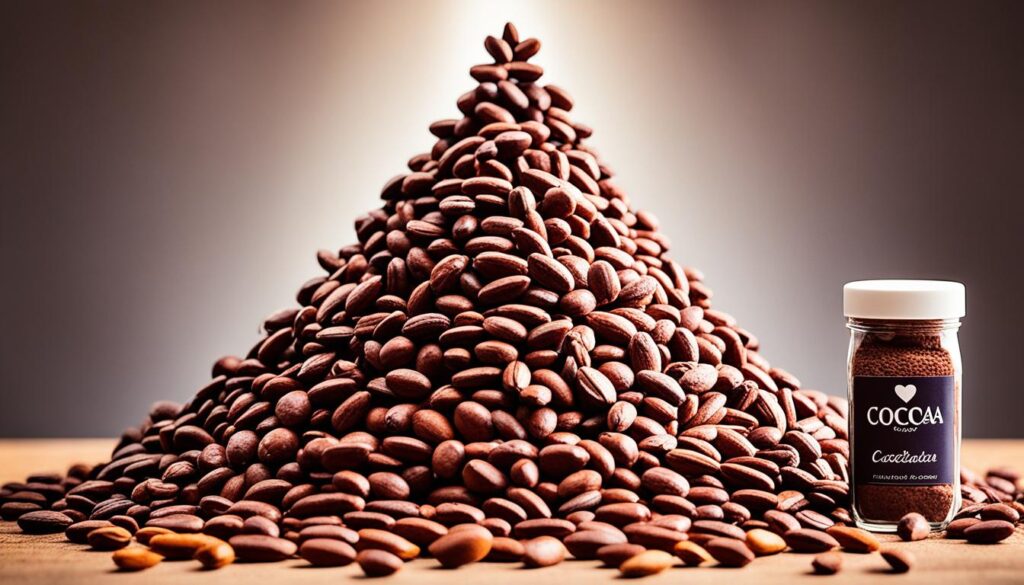Are you a chocoholic concerned about your heart health? Well, you’re not alone. Many individuals are curious about the relationship between their beloved cocoa indulgence and its impact on cardiovascular well-being. In this comprehensive article, we’ll delve into the fascinating world of cocoa consumption and uncover the potential benefits and risks it may hold for your heart health.
Cocoa, the key ingredient in chocolate, has long been touted for its rich, decadent flavor. But beyond its gustatory appeal, this versatile ingredient has also garnered attention for its potential cardiovascular benefits. As we explore the intriguing connection between cocoa and heart health, prepare to challenge your preconceptions and discover the surprising ways this indulgence can impact your overall well-being.
Key Takeaways
- Cocoa contains powerful antioxidants called flavanols that can support cardiovascular function.
- Moderate cocoa consumption has been linked to improved blood pressure and cholesterol levels.
- The type of chocolate (dark vs. milk) and the recommended intake levels are crucial factors to consider.
- Potential side effects of excessive cocoa or chocolate consumption should be addressed.
- Individual variability and lifestyle factors play a significant role in how cocoa affects heart health.
Introduction to Cocoa and Heart Health
Cocoa, the key ingredient in chocolate, has been consumed for centuries and is renowned for its rich, distinctive flavor. This section provides an overview of cocoa and its potential benefits for heart health. Cocoa, derived from the beans of the cacao tree, contains a variety of beneficial compounds, including flavanols, which have been associated with improved cardiovascular function and reduced risk of heart disease.
What is Cocoa?
Cocoa is a complex and versatile ingredient that has been an integral part of many cultures for centuries. It is derived from the beans of the cacao tree, which are fermented, dried, and roasted to produce the distinctive cocoa powder and cocoa nibs used in various food and beverage products, most notably chocolate.
The Potential Benefits of Cocoa Consumption
The potential benefits of cocoa consumption for cardiovascular health have been the subject of extensive research. Cocoa contains a wealth of bioactive compounds, including flavanols, which have been shown to possess antioxidant properties and may contribute to improved blood flow, reduced inflammation, and enhanced cholesterol levels – all of which are crucial factors in maintaining a healthy heart.
By understanding the unique characteristics of cocoa and exploring its potential health benefits, we can better appreciate how incorporating this flavorful ingredient into a balanced diet may support overall heart health.
Cocoa’s Antioxidant Properties

Cocoa, the key ingredient in chocolate, is renowned for its rich, distinctive flavor. But beyond its indulgent taste, cocoa is also a potent source of antioxidants, particularly a class of compounds called flavanols. These flavanols in cocoa have been the subject of extensive research for their potential cardiovascular benefits.
Flavanols: The Key Antioxidants in Cocoa
Flavanols are a type of cocoa antioxidants that are highly concentrated in the cacao bean. These powerful antioxidants have the ability to neutralize harmful free radicals, reducing oxidative stress within the body. Oxidative stress is a key contributor to the development of various cardiovascular issues, making antioxidants and heart health closely intertwined.
How Antioxidants Support Heart Health
By scavenging free radicals and mitigating oxidative stress, cocoa antioxidants can play a crucial role in maintaining a healthy cardiovascular system. Flavanols have been shown to improve the function of blood vessels, promoting vasodilation and enhancing blood flow. This, in turn, can contribute to lower blood pressure and better overall heart health. Additionally, antioxidants and heart health are closely linked, as the reduction of inflammation and other risk factors can help lower the risk of heart disease.
The concentrated presence of these beneficial flavanols in cocoa makes it a valuable addition to a heart-healthy diet. By understanding the antioxidant properties of cocoa and how they can support cardiovascular function, individuals can make informed choices about incorporating this versatile ingredient into their overall wellness regimen.
How does cocoa consumption affect heart health?

Numerous studies have shown that regular cocoa consumption can have a positive impact on various aspects of heart health. From improving blood pressure to enhancing cholesterol levels, the antioxidant-rich compounds found in cocoa have demonstrated the potential to reduce the risk of heart disease.
Improved Blood Pressure
One of the key benefits of cocoa and blood pressure is the ability of cocoa’s flavanols to improve the function of blood vessels. These compounds can promote vasodilation, or the widening of blood vessels, which in turn can help lower blood pressure. Several studies have found that cocoa consumption can lead to a modest but meaningful reduction in both systolic and diastolic blood pressure.
Better Cholesterol Levels
In addition to its effects on blood pressure, cocoa and cholesterol have also been the subject of extensive research. Cocoa has been associated with an increase in HDL (good) cholesterol and a decrease in LDL (bad) cholesterol. This balance of improved cholesterol levels can contribute to a reduced risk of cardiovascular complications, such as atherosclerosis and heart attacks.
Reduced Risk of Heart Disease
The combination of cocoa’s positive impact on blood pressure and cholesterol can ultimately lead to a lower risk of heart disease. By addressing these key cardiovascular risk factors, regular cocoa consumption has been linked to a reduced incidence of coronary heart disease, stroke, and other heart-related complications. The scientific evidence supporting these benefits continues to grow, providing a strong case for incorporating cocoa into a heart-healthy lifestyle.
Cocoa and Cardiovascular Risk Factors

Emerging research suggests that the consumption of cocoa can have a positive impact on various cardiovascular risk factors. Two key areas where cocoa has shown promise are in its effects on inflammation and insulin resistance, both of which play pivotal roles in the development of heart disease.
Effects on Inflammation
Chronic inflammation is a well-established contributor to cardiovascular disease. Interestingly, cocoa and its flavanol compounds have been found to possess potent anti-inflammatory properties. Studies have demonstrated that regular cocoa consumption can help reduce markers of systemic inflammation, such as C-reactive protein (CRP) and interleukin-6 (IL-6).
The antioxidant and anti-inflammatory effects of cocoa are believed to be attributed to its high concentration of flavanols, which can help mitigate the oxidative stress and inflammatory processes that underlie many cardiovascular conditions. By addressing this key risk factor, cocoa may play a role in reducing the overall burden of heart disease.
Impact on Insulin Resistance
Insulin resistance, a precursor to type 2 diabetes, is another significant risk factor for cardiovascular disease. Interestingly, cocoa consumption has been linked to improved insulin sensitivity and better glycemic control.
Studies have shown that regular intake of cocoa can enhance insulin signaling, leading to enhanced glucose uptake by cells and reduced blood sugar levels. This, in turn, can help mitigate the risks associated with insulin resistance, such as the development of metabolic syndrome and an increased risk of heart disease.
By positively influencing both inflammation and insulin resistance, cocoa emerges as a potentially valuable dietary component for supporting overall cardiovascular health and reducing the risk of heart disease.
Optimal Cocoa Consumption

As the potential benefits of cocoa consumption for heart health become increasingly evident, it is crucial to understand the optimal ways to incorporate it into one’s diet. This section examines the differences between dark chocolate and milk chocolate, as well as the recommended intake levels of cocoa to maximize the cardiovascular advantages while avoiding potential drawbacks.
Dark Chocolate vs. Milk Chocolate
When it comes to optimal cocoa consumption, the type of chocolate makes a significant difference. Dark chocolate, which typically contains a higher percentage of cocoa solids, is generally considered the more beneficial option compared to milk chocolate. Dark chocolate is richer in flavanols, the potent antioxidants that have been linked to improved cardiovascular function and reduced risk of heart disease. In contrast, milk chocolate often contains lower concentrations of these beneficial compounds, as well as higher amounts of added sugars and fats that can offset the potential health benefits.
Recommended Intake Levels
When it comes to recommended cocoa intake for optimal heart health, moderation is key. Most experts suggest that consuming 20-30 grams of high-quality dark chocolate, or the equivalent of 1-2 ounces, per day can provide the desired cardiovascular benefits without the risk of overconsumption. This amount of dark chocolate typically contains 200-400 milligrams of flavanols, which is within the recommended range for promoting heart health.
It’s important to note that excessive cocoa consumption, especially from high-sugar, high-fat milk chocolate, can lead to potential drawbacks, such as weight gain, increased calorie intake, and the potential for interactions with certain medications. Therefore, it is crucial to consume cocoa as part of a balanced, healthy diet and to be mindful of the recommended intake levels for optimal heart health benefits.
Potential Side Effects and Precautions

While the overall evidence suggests that moderate cocoa consumption can have positive effects on heart health, it’s important to be aware of the potential side effects and precautions associated with high cocoa consumption or excessive chocolate intake. One key concern is the risk of weight gain due to the high caloric content of many cocoa-based products, particularly those with added sugars and fats.
Additionally, the risks of high cocoa consumption may include increased calorie intake, potential interactions with certain medications, and in some cases, digestive issues. Individuals with specific health conditions, such as kidney stones or migraines, may need to exercise additional precautions when it comes to their cocoa consumption.
To minimize any potential risks and maximize the heart health benefits of cocoa, it’s crucial to consume it in moderation as part of an overall balanced and nutrient-dense diet. Guidance from healthcare professionals can help individuals determine the appropriate amount of cocoa or dark chocolate to incorporate into their lifestyle without compromising their well-being.
Incorporating Cocoa into a Healthy Diet

While the potential benefits of cocoa consumption for heart health are well-documented, it’s important to understand how to incorporate this superfood into a balanced and nutritious diet. By focusing on cocoa-rich recipes and pairing cocoa with other heart-healthy foods, individuals can maximize the cardiovascular advantages of this remarkable ingredient.
Cocoa-Rich Recipes
One of the easiest ways to incorporate more cocoa into your diet is by exploring a variety of delicious, cocoa-rich recipes. From dark chocolate-based treats to cocoa-infused baked goods, there are countless ways to enjoy the rich, indulgent flavor of cocoa while also reaping its heart-healthy benefits. Opt for recipes that feature high-quality dark chocolate or unsweetened cocoa powder, as these tend to have higher concentrations of the beneficial flavanols.
Pairing Cocoa with Other Heart-Healthy Foods
To further amplify the cardiovascular advantages of cocoa, consider pairing it with other heart-healthy foods. For example, enjoy a square of dark chocolate alongside a handful of nuts, which are rich in healthy fats and nutrients that can complement the effects of cocoa. You can also incorporate cocoa into smoothies, oatmeal, or yogurt, combining it with nutrient-dense ingredients like berries, avocado, or chia seeds.
Remember, it’s important to consume cocoa in moderation as part of an overall balanced and healthy diet. By thoughtfully incorporating cocoa-rich recipes and pairing cocoa with other heart-healthy foods, you can unlock the full cardiovascular benefits of this remarkable ingredient.
Individual Variability and Genetics

The effects of cocoa consumption on heart health can vary significantly from individual to individual. This is largely due to the concept of individual variability, where factors such as genetics, metabolism, and overall health status play a crucial role in determining how the body responds to the beneficial compounds found in cocoa.
Emerging research has shed light on the role of genetics in influencing an individual’s response to cocoa. Certain genetic variations can impact the way the body absorbs, metabolizes, and utilizes the antioxidants and other bioactive compounds present in cocoa. This genetic and cocoa response interplay can significantly affect the optimal cocoa intake levels for achieving optimal heart health outcomes.
Recognizing this individual variability is crucial when making personalized cocoa recommendations for heart health. Healthcare professionals and researchers are exploring ways to leverage genetic testing and Mendelian randomization techniques to better understand how an individual’s genetic profile may influence their optimal cocoa consumption for heart health benefits.
By accounting for these individual differences, healthcare providers can work with patients to develop tailored cocoa consumption strategies that maximize the potential cardiovascular advantages while minimizing any potential risks or side effects. This personalized approach can help ensure that each individual can enjoy the heart-healthy benefits of cocoa consumption to the fullest extent.
Ongoing Research and Future Directions

The relationship between ongoing cocoa research and heart health remains an active and evolving area of scientific investigation. Researchers continue to explore the future directions in cocoa and heart health, uncovering new insights and potential emerging cocoa benefits that could further enhance our understanding of this dynamic interaction.
One key focus of recent studies has been the exploration of novel applications and delivery methods for cocoa and its bioactive compounds. Researchers are examining the potential of cocoa-based supplements, functional foods, and even personalized dietary approaches to maximize the cardiovascular advantages of cocoa consumption.
Additionally, scientists are delving deeper into the underlying mechanisms by which cocoa influences various aspects of heart health, such as its effects on inflammation, endothelial function, and metabolic markers. By gaining a more comprehensive understanding of these pathways, researchers aim to refine and optimize cocoa-based interventions for optimal cardiovascular outcomes.
Moreover, the role of individual variability in the response to cocoa consumption continues to be a topic of keen interest. Ongoing studies are exploring the genetic and epigenetic factors that may influence an individual’s sensitivity to the beneficial compounds found in cocoa, with the goal of developing personalized recommendations for optimal heart health.
| Ongoing Cocoa Research Areas | Emerging Cocoa Benefits | Future Directions in Cocoa and Heart Health |
|---|---|---|
| Supplement and functional food formulations | Improved endothelial function | Personalized dietary recommendations |
| Mechanisms of action in cardiovascular health | Reduced inflammation | Optimized delivery methods |
| Individual genetic and epigenetic factors | Enhanced metabolic markers | Comprehensive understanding of underlying pathways |
As the scientific community continues to unravel the ongoing cocoa research, the potential for future directions in cocoa and heart health remains promising. With a steadfast commitment to exploring emerging cocoa benefits, researchers are poised to unlock new possibilities for leveraging the cardiovascular advantages of this remarkable plant-derived compound.
Lifestyle Factors and Heart Health

While the benefits of cocoa consumption for heart health are well-documented, it’s crucial to recognize that maintaining a healthy heart requires a comprehensive approach. In addition to moderate cocoa intake, other lifestyle factors such as exercise and stress management play a vital role in supporting overall cardiovascular well-being.
Exercise and Physical Activity
Regular physical activity and exercise have long been recognized as essential components of a heart-healthy lifestyle. Studies have consistently shown that regular exercise can significantly reduce the risk of heart disease by improving cardiovascular function, lowering blood pressure, and enhancing blood vessel health. Engaging in a variety of exercise activities, such as aerobic exercises, strength training, and flexibility exercises, can provide a well-rounded approach to heart health.
Stress Management
In addition to physical activity, effective stress management is crucial for maintaining a healthy heart. Chronic stress has been linked to a range of cardiovascular risk factors, including high blood pressure, inflammation, and insulin resistance. Incorporating stress-reducing techniques, such as meditation, yoga, or mindfulness practices, can help mitigate the negative impact of stress on heart health and work in concert with the cardiovascular benefits of cocoa consumption.
By embracing a holistic approach that combines the heart-healthy properties of cocoa with regular exercise and effective stress management, individuals can optimize their cardiovascular well-being and reduce their risk of heart disease. This integrated approach to lifestyle factors and heart health can help ensure a comprehensive and sustainable path to a healthier heart.
Conclusion
In conclusion, the evidence suggests that moderate cocoa consumption can have beneficial effects on heart health. The antioxidant properties of cocoa, particularly the flavanols, have been linked to improvements in blood pressure, cholesterol levels, and reduced cardiovascular risk factors. However, it’s important to consume cocoa in moderation and as part of an overall healthy lifestyle.
The key takeaways from this article are that incorporating cocoa, preferably in the form of dark chocolate, into a balanced diet can potentially offer advantages for heart health. The summary of cocoa’s benefits and risks highlights the importance of finding the right balance, as excessive consumption may lead to unintended consequences.
While the research on the connection between cocoa and heart health is promising, it’s essential to recognize the role of individual variability. Factors such as genetics, metabolism, and overall health status can influence how the body responds to cocoa. As the field of research continues to evolve, it will be crucial to explore personalized recommendations and the potential for new applications of cocoa in promoting cardiovascular well-being.

Leave a Reply